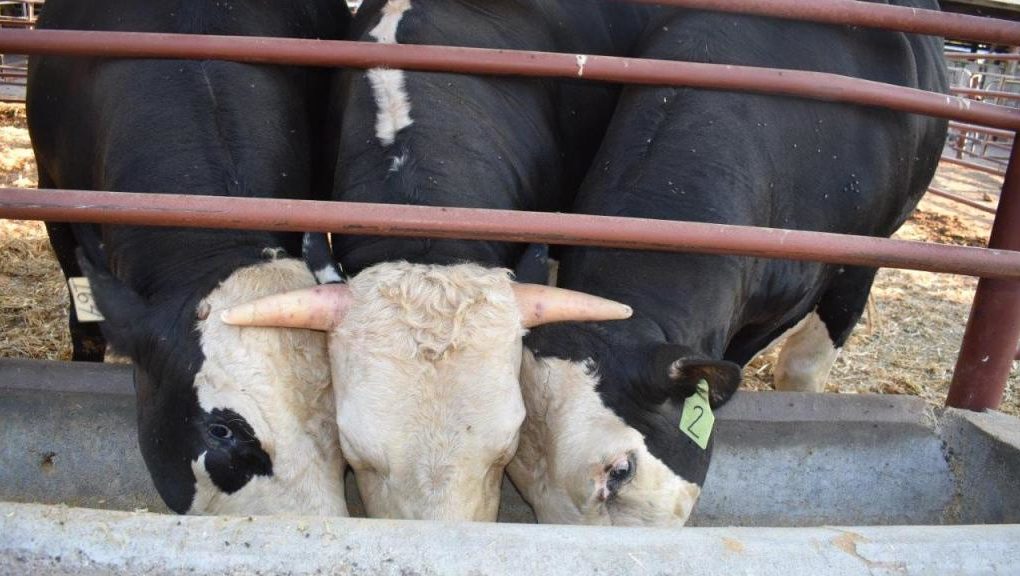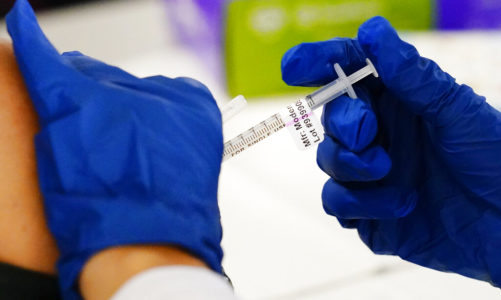Every year, millions of beef cattle are born without horns, a trait that naturally emerged in Scottish pastures in the 16th century and has since spared many lives from goring.
But when UC Davis created horn-free dairy cattle — through gene-editing, rather than generations of routine breeding — federal regulators did not welcome the new bovines to the herd.
Under rigorous federal rules established in the early years of the genomic revolution, and upheld during the Obama administration, genetically modified animals are considered to be a new type of veterinary pharmaceutical, needing FDA approval. Without it, meat and milk can’t enter the food supply. As a result, the nine cows — and the experiment — are now dead, burned, at a cost of $1,200 each.
“It was a waste. There wasn’t any risk,” said animal geneticist and professor Alison Van Eenennaam of UC Davis, who spent seven years on the project. “Basically, they were an unapproved drug.”

The horn-free cows are a textbook example of what a growing number of experts describe as bureaucratic overreach in the increasingly skilled field of gene-editing known as CRISPR-Cas9 and TALENs to select desirable traits in food animals, such as disease resistance and heat tolerance.
Charged with protecting consumer health, the FDA’s Center for Veterinary Medicine requires that anything that potentially affects the structure or function of a food animal, including a genetic change, be considered a veterinary drug. Researchers must undergo a lengthy New Animal Drug Application process before commercialization, as well as conduct additional data collection and paperwork before marketing meat or milk.
The rule applies even if the trait improves animal welfare, exists in other animals of the same species, and creates animals that are indistinguishable from ones created by conventional breeding.
“The strictness of the regulation … is seriously impairing innovation that could be quite beneficial not only to animals but also to our economy and our environment,” said Hank Greely, director of the Center for Law and the Biosciences at Stanford University. “This makes it so expensive and so long-term that it’s preventing people from doing useful things.”
Earlier this month, scientists at Washington State University earned FDA approval for human consumption of five pigs whose genes had been altered for sterility, not meat. Even though most of the university’s fees were waived, the process took two years and cost an estimated $200,000.
Gene editing may sound scary, conjuring up images of Frankenfood. A powerful and litigious anti-GMO lobby has repeatedly challenged regulatory rulings and sought to block market access of modified foods.
But the goal of the UC Davis project was to eliminate the stress, pain, time, equipment and veterinary care necessary to dehorn calves.
There is vast genetic variation among cattle breeds that contributes to the diversity of the species. One specific difference, found in Aberdeen Angus, causes animals to grow little knobs instead of horns. Without horns, the animals require less feed trough space, are easier and safer to handle and transport, and are less likely to injure other cattle.
But Angus are beef cattle. In contrast, most dairy cattle have horns, which are a menace and must be burned off. And while conventional breeding techniques have created some hornless varieties, the cows’ milk isn’t as good.
Van Eenennaam and her UC Davis team, in partnership with the Minnesota agtech startup Recombinetics, produced hornless dairy cattle between 2015 and 2017 by inserting a gene variant, called an allele, into two Angus bulls, who passed on to the offspring.passed it on to their calves. It’s like using scissors to cut out a single letter from a very large book and then replacing it, at the same location, with a different letter, copied from another edition of the same book.
They created the same trait as multigenerational breeding, using a shortcut. But none of the animals — an altered bull father and uncle, six progeny and a young calf — could go into the food supply without approval, according to the FDA.
The FDA’s tough policy was established many years ago when gene-editing tools were more blunt and there was little understanding of what tens of thousands of individual genes do, or how they interact with each other. New tools like CRISPR and TALENs enable scientists to add, delete and rearrange DNA with greater precision, but the FDA’s policy hasn’t changed.
Canada, Japan, Australia, Brazil, Argentina and several other meat-producing countries have a less lengthy and costly approval process. And gene editing in plants, which is overseen by the USDA, is much more loosely regulated.
But to the FDA, edited DNA does the same thing as a drug: It changes how our bodies work.
“Consumers expect the FDA to ensure their food is safe,” wrote Dr. Steven M. Solomon, former director of the FDA’s Center for Veterinary Medicine in an editorial in the journal Nature Biotechnology. “Unintended alterations can have unexpected and deleterious consequences no matter the size of the alteration or how it was produced.”
That ended the project. While the FDA’s approach makes sense for newly designed animal chemical drugs — or genetic changes that alter the characteristics of milk or meat — it was ludicrous to seek approval for a swap of a single gene variant, said Van Eenennaam. Nature makes millions of unregulated changes.
We’ve been eating Angus, with the hornless gene variant, for hundreds of years, she said. “And now it needs to be evaluated for risk?”
“DNA is not a drug,” she said. “If DNA is a drug, isn’t everybody full of drugs? Regulating genome-edited research animals as a drug is unworkable.”
Regulations are important, said Greely, but enforcement should be more closely matched to the risks and benefits in each particular case.
A coalition of animal bioscience research universities — UC Davis, Washington State University, the University of Missouri, Utah State University, Texas A&M and the University of Florida — this month wrote a letter to the Biden administration, urging reform.
Calling the current process “lengthy, expensive, and intensive,” they said “it was designed for development of actual drugs and not for hereditary changes in the genome.”
“The acts governing how agricultural biotechnology products are regulated were established well before the advent of gene-editing technologies,” they wrote. “There is need to modernize how this area of science is being applied to livestock production.”
𝗖𝗿𝗲𝗱𝗶𝘁𝘀, 𝗖𝗼𝗽𝘆𝗿𝗶𝗴𝗵𝘁 & 𝗖𝗼𝘂𝗿𝘁𝗲𝘀𝘆: www.mercurynews.com
𝗙𝗼𝗿 𝗮𝗻𝘆 𝗰𝗼𝗺𝗽𝗹𝗮𝗶𝗻𝘁𝘀 𝗿𝗲𝗴𝗮𝗿𝗱𝗶𝗻𝗴 𝗗𝗠𝗖𝗔,
𝗣𝗹𝗲𝗮𝘀𝗲 𝘀𝗲𝗻𝗱 𝘂𝘀 𝗮𝗻 𝗲𝗺𝗮𝗶𝗹 𝗮𝘁 dmca@enspirers.com




